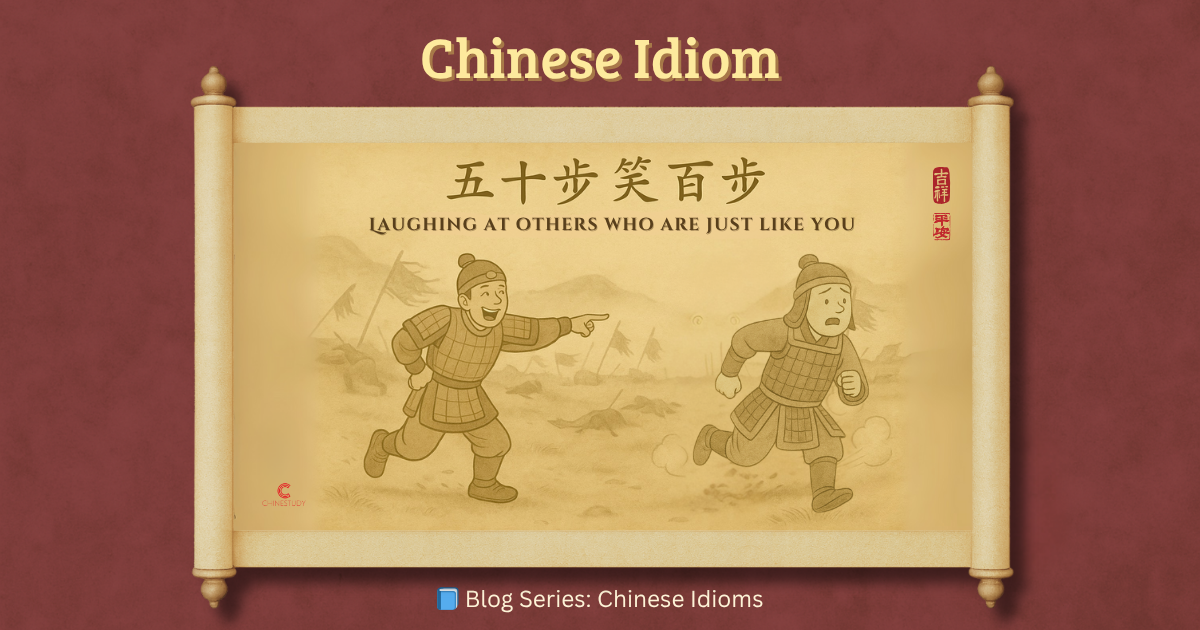😅 五十步笑百步 wǔ shí bù xiào bǎi bù – The Pot Calling the Kettle Black

🔍 What It Means
五十步笑百步 (wǔ shí bù xiào bǎi bù) literally means:
“The one who ran fifty steps laughs at the one who ran a hundred steps.”
Word-by-word breakdown:
- 五十 (wǔ shí) – fifty
- 步 (bù) – steps
- 笑 (xiào) – to laugh at
- 百 (bǎi) – one hundred
- 步 (bù) – steps
This idiom describes a situation where someone criticizes another person, even though they made the same mistake — just to a lesser degree.
It’s used to point out hypocrisy or a lack of self-awareness.
In English, it’s like saying:
- 😅 “The pot calling the kettle black”
- 🪞 “You’re not much better”
- 🙃 “You’re laughing at others, but you’re in the same boat”
🏺 Where It Comes From
This idiom comes from a famous conversation between Mencius (孟子, Mèng zǐ) and King Hui of Wei (魏惠王, Wèi huì wáng) during the Warring States period.
In 368 B.C., King Hui had worked hard to strengthen Wei. He launched wars against Han and Zhao, and won — regaining honor.
But victory made him arrogant.
He kept expanding war efforts, attacking bigger states like Qi, Qin, and Chu.
The wars drained Wei’s power. Ordinary people were angry and exhausted.
When Mencius visited the king, King Hui defended himself:
“I’ve ruled with care. I’ve saved people from floods and moved them to safety. Why haven’t things improved like in other countries?”
Mencius smiled and said,
“Your Majesty loves fighting, right?
Let me tell you a story.
Imagine a battle. One soldier runs away a hundred steps, another only fifty.
The one who ran fifty turns around and laughs, ‘Coward!’
But they’re both deserters. Both ran away.
Just like you and the other rulers — you wage war and hurt your people, just like they do.
Laughing at others when you’ve done the same — isn’t that foolish?”
King Hui paused and admitted, “That… makes sense.”
Mencius then said:
“If Your Majesty truly understands this, you’ll stop making excuses. Real progress means letting people live in peace and prosperity — not just doing a little better than others and thinking it’s enough.”
Since then, people have used the phrase 五十步笑百步 (wǔ shí bù xiào bǎi bù) to describe someone who laughs at another person’s flaws, while having similar flaws themselves — just to a lesser degree.
💬 How to Use It
Use 五十步笑百步 (wǔ shí bù xiào bǎi bù) when:
✅ Someone criticizes others for flaws they also have
✅ You want to point out hypocrisy
✅ The difference is only in degree — not in kind
🚫 Not for:
❌ Comparing unrelated things
❌ Criticizing someone much worse when you’re completely innocent
🎯 Real Examples
1.
你也每天迟到五分钟,还笑他说迟到十分钟,真是五十步笑百步。
(Nǐ yě měitiān chídào wǔ fēnzhōng, hái xiào tā shuō chídào shí fēnzhōng, zhēn shì wǔshí bù xiào bǎibù.)
You’re late by 5 minutes every day, and you laugh at him for being 10 minutes late? That’s totally “laughing at someone just like you.”
2.
别说我爱买东西了,你自己每天都在购物车结账,简直是五十步笑百步。
(Bié shuō wǒ ài mǎi dōngxī le, nǐ zìjǐ měitiān dōu zài gòuwùchē jiézhàng, jiǎnzhí shì wǔshí bù xiào bǎibù.)
Don’t say I shop too much — you check out your shopping cart every day. You’re just the same!
⚠️ Common Mistakes (Watch Out!)
❌ Wrong: Using it to describe big, obvious differences
✅ Correct: It only works when the actions are the same, just in degree.
❌ Wrong: Comparing stealing to murder — too far apart
✅ Correct: Hypocrisy about similar behavior
💡 Memory Tip
Picture two people running from battle.
🏃 One runs 100 steps.
🏃 The other runs 50 steps.
The second one turns around, laughing.
“Coward!” he shouts.
But… aren’t you both still running?
🧩 Interactive Practice
Translate this sentence into English:
- 你批评她太早放弃,可你自己也放弃了,真是五十步笑百步。
Answer:
You’re criticizing her for quitting early, but you gave up too — just a little later!
🌟 Final Thoughts
五十步笑百步 (wǔ shí bù xiào bǎi bù) reminds us:
Sometimes we think we’re better than others — but we’re doing the same thing.
So before pointing fingers, ask:
🤔 Am I really any different?
🏮 One story ends, but many more await…
👉 Check out my audiobook: Chinese Idioms Made Easy
👉 Stay tuned for the next idiom in this series!
Thank you for subscribing!
Have a great day!